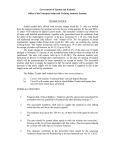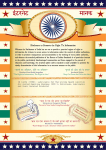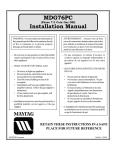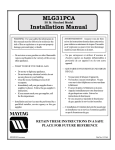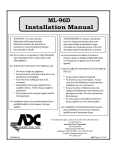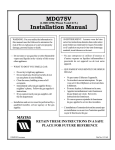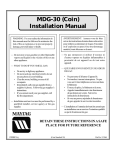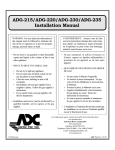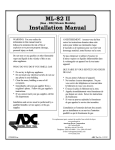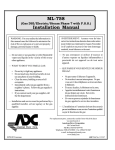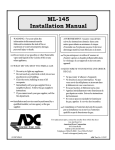Download Maytag MLG32PD3 Installation manual
Transcript
MLG32PD3 30 lb. Stacked Model Installation Manual WARNING: For your safety the information in this manual must be followed to minimize the risk of fire or explosion or to prevent property damage, personal injury or death. AVERTISSEMENT: Assurez-vous de bien suivre les instructions données dans cette notice pour réduire au minimum le risque d’incendie ou d’explosion ou pour éviter tout dommage matériel, toute blessure ou la mort. Do not store or use gasoline or other flammable vapor and liquids in the vicinity of this or any other appliance. Ne pas entreposer ni utiliser d’essence ni d’autres vapeurs ou liquides inflammables dans le voisinage de cet appareil ou de tout autre appareil. WHAT DO YOU DO IF YOU SMELL GAS * Do not try to light any appliance. * Do not touch any electrical switch; do not use any phone in your building. * Clear the room, building or area of all occupants. * Immediately call your gas supplier from a neighbor's phone. Follow the gas supplier's instructions. * If you cannot reach your gas supplier, call the fire department. Installation and service must be performed by a qualified installer, service agency or the gas supplier. QUE FAIRE SI VOUS SENTEZ UNE ODEUR DE GAZ: * Ne pas tenter d’allumer d’appareil. * Ne touchez à aucun interrupteur. Ne pas vous servir des téléphones se trouvant dans le bâtiment où vous vous trouvez.. * Évacuez la pièce, le bâtiment ou la zone. * Appelez immédiatement votre fournisseur de gaz depuis un voisin. Suivez les instructions du fournisseur. * Si vous ne pouvez rejoindre le fournisseur de gaz, appelez le service des incendies. L’installation et l’entretien doivent être assurés par un installateur ou un service d’entretien qualifié ou par le fournisseur de gaz. RETAIN THESE INSTRUCTIONS IN A SAFE PLACE FOR FUTURE REFERENCE 101000GS/rar Part No. 113158 Retain This Manual In A Safe Place For Future Reference This product embodies advanced concepts in engineering, design, and safety. If this product is properly maintained, it will provide many years of safe, efficient, and trouble-free operation. ONLY qualified technicians should service this equipment. OBSERVE ALL SAFETY PRECAUTIONS displayed on the equipment or specified in the installation manual included with the dryer. The following “FOR YOUR SAFETY” caution must be posted near the dryer in a prominent location. FOR YOUR SAFETY POUR VOTRE SÉCURITÉ Do not store or use gasoline or other flammable vapors or liquids in the vicinity of this or any other appliance. Ne pas entreposer ni utiliser d’essence ni d’autres vapeurs ou liquides inflammables dans le voisinage de cet appareil ou de yout autre appareil. We have tried to make this manual as complete as possible and hope you will find it useful. Manufacturer reserves the right to make changes from time to time, without notice or obligation, in prices, specifications, colors, and material, and to change or discontinue models. Important For your convenience, log the following information: DATE OF PURCHASE ____________________________ MODEL NO. MLG32PD3 __________________________________________ DISTRIBUTOR’S NAME ___________________________________________________________________________________ Serial Number(s) ________________________________________________________________________________________ ________________________________________________________________________________________ ________________________________________________________________________________________ For replacement parts, contact the distributor from which the dryer was purchased or contact: MAYTAG 403 West Fourth Street North Newton, Iowa 50208 (515) 787-7000 “IMPORTANT NOTE TO PURCHASER” Information must be obtained from your local gas supplier on the instructions to be followed if the user smells gas. These instructions must be posted in a prominent location near the dryer. IMPORTANT YOU MUST DISCONNECT and LOCKOUT THE ELECTRIC SUPPLY and THE GAS SUPPLY BEFORE ANY COVERS or GUARDS ARE REMOVED FROM THE MACHINE TO ALLOW ACCESS FOR CLEANING, ADJUSTING, INSTALLATION, or TESTING OF ANY EQUIPMENT per OSHA (Occupational Safety and Health Administration) STANDARDS. “Caution: Label all wires prior to disconnection when servicing controls. Wiring errors can cause improper operation.” «Attention: Lor des opérations d’entretien des commandes étiqueter tous fils avant de les déconnecter. Toute erreur de câblage peut étre une source de danger et de panne.» CAUTION DRYERS SHOULD NEVER BE LEFT UNATTENDED WHILE IN OPERATION. WARNING CHILDREN SHOULD NOT BE ALLOWED TO PLAY ON OR NEAR THE DRYERS. CHILDREN SHOULD BE SUPERVISED IF NEAR DRYERS IN OPERATION. FOR YOUR SAFETY DO NOT DRY MOP HEADS IN THE DRYER. DO NOT USE DRYER IN THE PRESENCE OF DRY CLEANING FUMES. WARNING UNDER NO CIRCUMSTANCES should the door switch or the heat circuit devices ever be disabled. WARNING The dryer must never be operated with any of the back guards, outer tops, or service panels removed. PERSONAL INJURY or FIRE COULD RESULT. WARNING DRYER MUST NEVER BE OPERATED WITHOUT THE LINT FILTER/SCREEN IN PLACE...EVEN IF AN EXTERNAL LINT COLLECTION SYSTEM IS USED. IMPORTANT PLEASE OBSERVE ALL SAFETY PRECAUTIONS displayed on the equipment and/or specified in the installation manual included with the dryer. The wiring diagram for the dryer is located in the front electrical control box area. Table of Contents SECTION I IMPORTANT INFORMATION ............................................................................... 3 A. Recieving and Handling ............................................................................................................... 3 B. Safety Precautions ...................................................................................................................... 4 SECTION II SPECIFICATIONS .................................................................................................... 6 SECTION III INSTALLATION PROCEDURES ........................................................................... 8 A. B. C. D. E. F. G. H. I. J. Unpacking/Setting Up ................................................................................................................. 8 Location of the Dryer .................................................................................................................. 8 Dryer Enclosure Requirements .................................................................................................. 10 Fresh Air Supply ....................................................................................................................... 10 Exhaust Requirements ............................................................................................................... 12 Electrical Information ................................................................................................................ 16 Gas Information ........................................................................................................................ 19 Preparation For Operation ........................................................................................................ 22 Preoperational Tests ................................................................................................................. 22 Shut Down Instructions ............................................................................................................. 24 SECTION IV OPERATING INSTRUCTIONS ............................................................................ 25 A. Starting the Dryer ..................................................................................................................... 25 SECTION V SERVICE/PARTS INFORMATION ...................................................................... 26 A. Service ..................................................................................................................................... 26 B. Parts ........................................................................................................................................ 26 SECTION VI WARRANTY INFORMATION .............................................................................. 27 A. Returning Warranty Cards(s) ..................................................................................................... 27 B. Warranty .................................................................................................................................. 27 SECTION VII ROUTINE MAINTENANCE .................................................................................. 28 A. Cleaning ................................................................................................................................... 28 B. Adjustments ............................................................................................................................. 30 C. Lubrication ............................................................................................................................... 30 SECTION VIII DRYER DATA LABEL INFORMATION ............................................................. 31 A. Data Label Location ................................................................................................................. 31 B. Data Label ............................................................................................................................... 32 SECTION IX PROCEDURE FOR FUNCTIONAL CHECK OF REPLACEMENT COMPONENTS ................................................................ 34 SECTION I IMPORTANT INFORMATION A. RECEIVING and HANDLING The dryer is shipped in a protective stretch wrap cover with protective cardboard corners and top cover (or optional box) as a means of preventing damage in transit. Upon delivery, the dryer and packaging, and wooden skid should be visually inspected for shipping damage. If any damage is noticed, inspect further before delivering carrier leaves. Dryers Damaged in Shipment: 1. ALL dryers should be inspected upon receipt and before they are signed for. 2. If there is suspected damage or actual damage, the trucker’s receipt should be so noted. 3. If the dryer is damaged beyond repair, it should be refused. Those dryers which were not damaged in a damaged shipment should be accepted, but the number received and the number refused must be noted on the receipt. 4. If you determine that the dryer was damaged after the trucker has left your location, you should call the delivering carrier’s freight terminal immediately and file a claim. The freight company considers this concealed damage. This type of freight claim is very difficult to get paid and becomes extremely difficult when more than a day or two passes after the freight was delivered. It is your responsibility to file freight claims. Dryer or parts damaged in transit cannot be claimed under warranty. 5. Freight claims are the responsibility of the consignee, and ALL claims must be filed at the receiving end. The manufacturer assumes no responsibility for freight claims or damages. IMPORTANT: The basket (tumbler) section of the dryer must be transported and handled in an upright position at ALL times. 3 B. SAFETY PRECAUTIONS WARNING: For your safety, the information in this manual must be followed to minimize the risk of fire or explosion or to prevent property damage, personal injury, or loss of life. WARNING: The dryer must never be operated with any of the back guards, outer tops, or service panels removed. PERSONAL INJURY or FIRE COULD RESULT. 1. DO NOT store or use gasoline or other flammable vapors and liquids in the vicinity of this or any other appliance. 2. Purchaser or user should consult the local gas supplier for proper instructions to be followed in the event the user smells gas. The instructions should be posted in a prominent location. 3. WHAT TO DO IF YOU SMELL GAS... a. DO NOT try to light any appliance. b. DO NOT touch any electrical switch. c. DO NOT use any phone in your building. d. Clear the room, building, or area of ALL occupants. e. Immediately call your gas supplier from a neighbor’s phone. Follow the gas supplier’s instructions. f. If you cannot reach your gas supplier, call the fire department. 4. Installation and service must be performed by a qualified installer, service agency, or gas supplier. 5. Dryers must be exhausted to the outdoors. 6. Although this dryer is a very versatile machine, there are some articles that, due to fabric composition or cleaning method, should not be dried in it. WARNING: Dry only water washed fabrics. DO NOT dry articles spotted or washed in dry cleaning solvents, a combustible detergent, or “ALL purpose” cleaner. EXPLOSION COULD RESULT. WARNING: DO NOT dry rags or articles coated or contaminated with gasoline, kerosene, oil, paint, or wax. EXPLOSION COULD RESULT. WARNING: DO NOT dry mop heads. Contamination by wax or flammable solvents will create a fire hazard. 4 WARNING: DO NOT use heat for drying articles that contain plastic, foam, sponge rubber, or similarly textured rubberlike materials. Drying in a heated basket (tumbler) may damage plastics or rubber and also may be a fire hazard. 7. A program should be established for the inspection and cleaning of lint in the heating unit area, exhaust duct work, and inside the dryer. The frequency of inspection and cleaning can best be determined from experience at each location. WARNING: The collection of lint in the burner area and exhaust duct work can create a potential fire hazard. 8. For personal safety, the dryer must be electrically grounded in accordance with local codes or the National Electrical Code ANSI/NFPA NO. 70-LATEST EDITION, or in Canada, the Canadian Electrical Codes Parts 1 & 2 CSA C22.1-1990 or LATEST EDITION. NOTE: Failure to do so will VOID THE WARRANTY. 9. UNDER NO CIRCUMSTANCES should the dryer door switch, lint door switch, or heat safety circuit ever be disabled. WARNING: PERSONAL INJURY or FIRE COULD RESULT. 10. This dryer is not to be used in the presence of dry cleaning solvents or fumes. 11. Remove articles from the dryer as soon as the drying cycle has been completed. WARNING: Articles left in the dryer after the drying and cooling cycles have been completed can create a fire hazard. 12. READ and FOLLOW ALL CAUTION and DIRECTION LABELS ATTACHED TO THE DRYER. WARNING: YOU MUST DISCONNECT and LOCKOUT THE ELECTRIC SUPPLY and THE GAS SUPPLY BEFORE ANY COVERS or GUARDS ARE REMOVED FROM THE MACHINE TO ALLOW ACCESS FOR CLEANING, ADJUSTING, INSTALLATION, or TESTING OF ANY EQUIPMENT per OSHA (Occupational Safety and Health Administration) STANDARDS. 13. Dryer must not be installed in an area where it will be exposed to water or weather. 14. Warning - Dryer must never be operated with the lint filter or screen not in place, even if an external lint collection system is used. 15. For safety, proper operation, and optimum performance, the dryer must not be operated with a load less than sixty-six percent (66%) - 20 pounds (8.98 kg) of its rated capacity. 5 SECTION II SPECIFICATIONS NOTE: Manufacturer reserves the right to make changes in specifications at any time without notice or obligation. 6 MLG32PD3 GAS MAXIMUM C APACITY (DRY WEIGHT) BASKET (TUMBLER) DIAMETER BASKET (TUMBLER) DEPTH BASKET (TUMBLER) VOLUME (PER BASKET [TUMBLER]) BASKET (TUMBLER) MOTOR (PER BASKET [TUMBLER]) DOOR O PENING - DIAMETER (PER BASKET [TUMBLER]) AIRFLOW (PER BASKET [TUBLER]) HEAT INPUT (TOTAL FOR BOTH BASKETS [TUMBLERS]) GAS INLET PIPE SIZE EXHAUST DUCT O UTLET APPROX. WEIGHT (UNCRATED) APPROX. WEIGHT (C RATED) ELECTRIC REQUIREMENTS (PER TUMBLER) 30 lbs.* 27-1/4" 30" 10.1 cu. ft.* 1/2 HP 21-1/2" 420 cfm* 190,000 btu/hr 8" 850 lbs. 880 lbs. 13.6 kg 69.21 cm 76.2 cm 28.3 cu. m. 0.372 kw 54.61 cm 11.89 cmm 47,880 kcal/hr 3/4" N.P.T. 20.32 cm 386 kg 399 kg 120 Volt, 1-Phase (1ø) 9-Amp* Shaded areas are stated in metric equivalents * Per basket (tumbler)/pocket. NOTE: Manufacturer reserves the right to make changes in specifications at any time without notice or obligation. 7 SECTION III INSTALLATION PROCEDURES Installation should be performed by competent technicians in accordance with local and state codes. In the absence of these codes, the installation must conform to applicable American National Standards: ANSI Z223.1LATEST EDITION (National Fuel Gas Code) or ANSI/NFPA NO. 70-LATEST EDITION (National Electrical Code) or in Canada, the installation must conform to applicable Canadian Standards: CAN/CGA-B149.1-M91 (Natural Gas) or CAN/CGA-B149.2-M91 (liquid propane [L.P.] Gas) or LATEST EDITION (for General Installation and Gas Plumbing) or Canadian Electrical Codes Parts 1 & 2 CSA C22.1-1990 or LATEST EDITION (for Electrical Connections). A. UNPACKING/SETTING UP Remove protective shipping material (i.e., plastic wrap and optional shipping box) from dryer. NOTE: The access keys for the service doors are included in the information packet shipped in the basket (tumbler). These keys should be removed and put in a safe place yet made accessible because some will be needed throughout various phases in the installation of the dryer. Dryers are shipped with a coin box and coin box faceplate ONLY. The coin box lock is not included and must be purchased elsewhere or the lock can be ordered as a parts order from the manufacturer. The dryer can be moved to its final location while still attached to the skid or with the skid removed. To unskid the dryer, locate and remove the four (4) bolts securing the base of the dryer to the wooden skid. Two (2) are at the rear of the base, and two (2) are located in the front. Once the bolts are removed, slide the dryer off the skid. With the skid removed, to make it easier to slide the dryer into its final position, slightly lower ALL four (4) leveling legs, so that the dryer will slide on the legs instead of the base frame. The dryer is equipped with four (4) leveling legs, one (1) at each corner of the dryer base. The hex head adjustment bolts for the two (2) front leveling legs are located directly behind the lower access door, and the rear two (2) adjustments are directly behind the lower rear back (guard) panel. B. LOCATION OF THE DRYER Before installing the dryer, be sure the location conforms to local codes and ordinances. In the absence of such codes or ordinances the location must conform with the National Fuel Gas Code ANSI.Z223.1-LATEST EDITION, or in Canada, the Canadian Installation Codes CAN/CGA-B149.1-M91 (Natural Gas) or CAN/ CGA-B149.2-M91 (L.P. Gas) or LATEST EDITION. 8 1. The dryer must be installed on a sound level floor capable of supporting its weight. Carpeting must be removed from the floor area that the dryer is to rest on. IMPORTANT: “The dryer must be installed on noncombustible floors only.” 2. The dryer must not be installed or stored in an area where it will be exposed to water or weather. 3. The dryer is for use in noncombustible locations. 4. Provisions for adequate air supply must be provided as noted in this manual (refer to Fresh Air Supply in Section D). 5. Clearance provisions must be made from noncombustible construction as noted in this manual (refer to Dryer Enclosure Requirements in Section C). Even though a 12-inch (30.48 cm) clearance is acceptable, it is recommended that the rear of the dryer be positioned approximately 2 feet (0.61 meters) away from the nearest obstruction, i.e., wall, for ease of installation, maintenance, and service. (Refer to the illustration below.) 6. Provisions must be made for adequate clearances for servicing and for operation as noted in this manual (refer to Dryer Enclosure Requirements in Section C). 7. Dryer must be exhausted to the outdoors in an area where correct exhaust venting can be achieved as noted in this manual (refer to Exhaust Requirements in Section E). 8. Dryer must be located in an area where correct exhaust venting can be achieved as noted in this manual (refer to Exhaust Requirements in Section E). IMPORTANT: Dryer should be located where a minimum amount of exhaust duct will be necessary. 9 C. DRYER ENCLOSURE REQUIREMENTS Bulkheads and partitions should be made of noncombustible materials and must be located a minimum of 12-inches (30.48 cm) - (18-inches [45.72 cm] or more is recommended for ease of installation, maintenance, and service) - above the dryer’s outer top, except along the front of the dryer which may be closed in if desired. NOTE: Even though a minimum of 12-inches (30.48 cm) above the dryer’s outer top is acceptable, a clearance of 18-inches (45.72 cm) - (or more) - is suggested for ease of installation and service (electrical power connections). NOTE: When fire sprinkler systems are located above the dryers, a minimum of 12-inches (30.48 cm) above the dryer’s outer top is required. NOTE: Allowances must be made for opening the control door. Dryers may be positioned sidewall to sidewall. However, allowances must be made for opening and closing of the control door and the lint door. It is suggested that the dryer be positioned about 2 feet (0.61 meters) away from the nearest obstruction for ease of installation, maintenance, and service (to be measured from the back guard.) Refer to the previous illustration on page 9 for details. NOTE: Air considerations are important for proper and efficient operation. D. FRESH AIR SUPPLY Air supply (make-up air) must be given careful consideration to assure proper performance of each dryer. An unrestricted source of 840 cfm (cubic feet per minute) - 23.78 cmm (cubic meters per minute) - is necessary for each dryer. An unrestricted air entrance from the outdoors (atmosphere) of a minimum of 1-1/2 square feet (0.13 square meters) is required for each dryer. This area must be enlarged if louvers or registers cover the opening. It is not necessary to have a separate make-up air opening for each dryer. Common make-up air openings are acceptable. However, they must be set up in such a manner that the make-up air is distributed equally to the dryers. For example, for a bank of eight (8) dryers, a total make-up air opening of 12 square feet (1.11 square meters) is required. Two (2) openings measuring 2 feet by 3 feet (0.61 meters by 0.91 meters) - 6 square feet (0.55 square meters) - are acceptable. (Refer to the illustration on page 11.) Allowances must be made for remote or constricting passageways or where dryers are located at excessive altitudes or predominantly low-pressure areas. IMPORTANT: Make-up air must be provided from a source free of dry cleaning solvent fumes. Make-up air that is contaminated by dry cleaning solvent fumes will result in irreparable damage to the motors and other dryer components. 10 IMPORTANT: Make-up air openings should not be located near duct work exhaust outlets. If make-up air openings are too close to the exhaust outlet, lint and fumes may be drawn back into the dryer area through these openings. NOTE: Component failure due to dry cleaning fumes will VOID THE WARRANTY. 11 E. EXHAUST REQUIREMENTS Exhaust duct work should be designed and installed by a qualified professional. Improperly sized duct work will create excessive back pressure which results in slow drying, increased use of energy, overheating of the dryer, and shutdown of the burner by the airflow (sail) switches, burner hi-limits, or basket (tumbler) hi-heat thermostats. CAUTION: IMPROPERLY SIZED or INSTALLED EXHAUST DUCT WORK CAN CREATE A POTENTIAL FIRE HAZARD. The exhaust duct work should be laid out in such a way that the duct work travels as directly as possible to the outdoors with as few turns as possible. When single dryer venting is used, the duct work from the dryer to the outside exhaust outlet must not exceed 10 feet (3.05 meters). In the case of multiple (common) dryer venting, the distance from the last dryer to the outside exhaust outlet must not exceed 20 feet (6.1 meters). The shape of the exhaust duct work is not critical so long as the minimum cross-sectional area is provided. 1. Single Dryer Venting Where possible, it is suggested to provide a separate exhaust duct for each dryer. The exhaust duct work should be laid out in such a way that the duct work travels as directly as possible to the outdoors with as few turns as possible. It is suggested that the use of 90º turns in ducting be avoided; use 30º or 45º angles instead. The shape of the exhaust duct work is not critical so long as the minimum cross-sectional area is provided. IMPORTANT: Exhaust back pressure measured by a manometer at the dryer’s exhaust duct area must not exceed 0.3 inches of water column (W.C.) - 0.74 mb - when both baskets (tumblers) are operating. It is suggested that the duct work from each dryer not exceed 10 feet (3.05 meters) with no more than two (2) elbows. If the duct work exceeds 10 feet (3.05 meters) or has numerous elbows, the cross-sectional area of the duct work must be increased in proportion to length or number of elbows in it. IMPORTANT: For extended duct work runs, the cross-sectional area of the duct work can only be increased to an extent. Maximum proportional duct work runs cannot exceed 10 feet (3.05 meters) more than the original limitations of 10 feet (3.05 meters) with two (2) elbows. When the duct work approaches the maximum limits as noted in this manual, a professional heating, venting, and air-conditioning (HVAC) firm should be consulted for proper venting information. The duct work should be smooth inside with no projections from sheet metal screws or other obstructions, which will collect lint. When adding ducts, the duct to be added should overlap the duct to which it is to be connected. ALL duct work joints must be taped to prevent moisture and lint from escaping into the building. Also, inspection doors should be installed at strategic points in the exhaust duct work for periodic inspection and cleaning. 12 NOTE: When the exhaust duct work passes through a wall, ceiling, or roof made of combustible materials, the opening must be 2-inches (5.08 cm) larger than the duct (ALL the way around). The duct must be centered within this opening. To protect the outside end of the horizontal duct work from the weather, a 90º elbow bent downward should be installed where the exhaust exits the building. If the exhaust duct work travels vertically up through the roof, it should be protected from the weather by using a 180º turn to point the opening downward. In either case, allow at least twice the diameter of the duct between the duct opening and nearest obstruction. IMPORTANT: DO NOT use screens or caps on the outside opening of the exhaust duct work. NOTE: In situations where a 10-inch (25.4 cm) exhaust duct is required or acceptable, to ease installation an 8-inch (20.32 cm) dryer exhaust outlet size to 10-inch (25.4 cm) exhaust duct increaser (transition piece) is available from the factory by ordering Part No. 882099. 13 2. Multiple Dryer (Common) Venting If it is not feasible to provide separate exhaust ducts for each dryer, ducts from individual dryers may be channeled into a common main duct. The individual ducts should enter the bottom or side of the main duct at an angle not more than 45º in the direction of the airflow. IMPORTANT: No more than eight (8) dryers should be connected to one (1) main common duct. NOTE: Refer to the illustration on page 15 for examples of multiple dryer (common) venting. The main duct may be any shape so long as the minimum cross-sectional area is provided. The illustration on page 15 shows the minimum cross-sectional area for multiple dryer venting. These figures must be increased in proportion if the main duct run from the last dryer to where it exhausts to the outdoors is unusually long (over 20 feet [6.1 meters]) or has numerous elbows (more than one [1]) in it. IMPORTANT: For extended duct work runs, the cross-sectional area of the duct work can only be increased to an extent. Maximum proportional duct work runs cannot exceed 20 feet (6.1 meters) more than the original limitations of 20 feet (6.1 meters) with one (1) elbow. When the duct work approaches the maximum limits as noted in this manual, a professional heating, venting, and air-conditioning (HVAC) firm must be consulted for proper venting information. IMPORTANT: Exhaust back pressure measured by a manometer at the dryer’s exhaust duct area must not exceed 0.3 inches of water column (W.C.) - 0.74 mb - when both baskets (tumblers) are operating. The duct work should be smooth inside with no projections from sheet metal screws or other obstructions which will collect lint. When adding ducts, the duct to be added should overlap the duct to which it is to be connected. ALL duct work joints must be taped to prevent moisture and lint from escaping into the building. Also, inspection doors should be installed at strategic points in the exhaust duct work for periodic inspection and cleaning. NOTE: When the exhaust duct work passes through a wall, ceiling, or roof made of combustible materials, the opening must be 2-inches (5.08 cm) larger than the duct (ALL the way around). The duct must be centered within this opening. To protect the outside end of the horizontal duct work from the weather, a 90º elbow bent downward should be installed where the exhaust exits the building. If the exhaust duct work travels vertically up through the roof, it should be protected from the weather by using a 180º turn to point the opening downward. In either case, allow at least twice the diameter of the duct between the duct opening and nearest obstruction. 14 IMPORTANT: DO NOT use screens or caps on the outside opening of the exhaust duct work. NOTE: In situations where a 10-inch (25.4 cm) exhaust duct is required or acceptable, to ease installation an 8-inch (20.32 cm) dryer exhaust outlet size to 10-inch (25.4 cm) exhaust duct increaser (transition piece) is available from the factory by ordering Part No. 882099. 15 F. ELECTRICAL INFORMATION 1. Electrical Requirements It is your responsibility to have ALL electrical connections made by a properly licensed and competent electrician to assure that the electrical installation is adequate and conforms with local and state regulations or codes. In the absence of such codes, ALL electrical connections, materials, and workmanship must conform to the applicable requirements of the National Electrical Code ANSI/NFPA NO. 70-LATEST EDITION, or in Canada, the Canadian Electrical Codes Parts 1 &2 CSA C22.1-1990 or LATEST EDITION. IMPORTANT: Failure to comply with these codes or ordinances, or the requirements stipulated in this manual, can result in personal injury or component failure. NOTE: Component failure due to improper installation will VOID THE WARRANTY. A separate circuit serving each dryer must be provided. The dryer must be connected to copper wire ONLY. DO NOT use aluminum wire which could cause a fire hazard. NOTE: The use of aluminum wire will VOID THE WARRANTY. 2. Grounding A ground (earth) connection must be provided and installed in accordance with state and local codes. In the absence of these codes, grounding must conform to applicable requirements of the National Electrical Code ANSI/NFPA NO. 70-LATEST EDITION, or in Canada, the Canadian Electrical Codes Parts 1 & 2 CSA C22.1-1990 or LATEST EDITION. The ground connection may be to a proven earth ground at the location service panel. For added personal safety, when possible, it is suggested that a separate ground wire (per local codes) be connected from the ground connection of the dryer to a grounded cold water pipe. DO NOT ground to a gas pipe or hot water pipe. The grounded cold water pipe must have metal to metal connection ALL the way to electrical ground. If there are any nonmetallic interruptions, such as, a meter, pump, plastic, rubber, or other insulating connectors, they must be jumped with no. 4 copper wire and securely clamped to bare metal at both ends. IMPORTANT: For personal safety and proper operation, the dryer must be grounded. 16 3. Electrical Connections A wire diagram is located on the inside of the control (service) box for connection data. a. Single-Phase (1ø) Hookup The electrical connections on ALL single-phase (1ø) dryers are made into the junction box located at the upper rear of the dryer. A separate circuit servicing each dryer basket (tumbler) must be provided. SINGLE-PHASE (1Ø) ELECTRICAL CONNECTION LEADS Black + Positive White Neutral or L2 17 Green Ground Providing local codes permit, power to the dryer can be made by use of a flexible U.L. listed power cord or pigtail (wire size must conform to the rating of the dryer), or the dryer can be hard wired directly to the service breaker panel. In both cases, a strain relief must be installed where the wiring enters the dryer. ELECTRIC SERVICE SPECIFICATIONS (PER TUMBLER) A separate circuit breaker must be provided for each tumbler/pocket. NOTE: Circuit breakers are thermal magnetic (industrial) type ONLY. For others, calculate/verify correct breaker size according to appliance amp draw rating and type of breaker used. SERVICE VOLTAGE PHASE WIRE SERVICE APPROX. AMP DRAW MINIMUM WIRE SIZE* CIRCUIT BREAKER 120 1ø 2 9.8 12 15 * AWG Stranded Type Wire for individual lengths less than 100 feet (30.48 meters). NOTE: Contact factory for electrical information not listed. NOTE: Manufacturer reserves the right to make changes in specifications at any time without notice or obligation. 18 G. GAS INFORMATION It is your responsibility to have ALL plumbing connections made by a qualified professional to assure that the gas plumbing installation is adequate and conforms with local and state regulations or codes. In the absence of such codes, ALL plumbing connections, materials, and workmanship must conform to the applicable requirements of the National Fuel Gas Code ANSI Z223.1-LATEST EDITION, or in Canada, the Canadian Installation Codes CAN/CGA-B149.1-M91 (Natural Gas) or CAN/CGA-B149.2-M91 (liquid propane [L.P.] Gas) or LATEST EDITION. IMPORTANT: Failure to comply with these codes or ordinances, and/or the requirements stipulated in this manual, can result in personal injury and improper operation of the dryer. The dryer and its individual shutoff valve must be disconnected from the gas supply piping system during any pressure testing of that system at test pressures in excess of 1/2 psig (3.5 kPa). The dryer must be isolated from the gas supply piping system by closing its individual manual shutoff valve during any pressure testing of the gas supply system at test pressures equal to or less than 1/2 psig (3.5 kPa). IMPORTANT: Failure to isolate or disconnect the dryer from supply as noted can cause irreparable damage to the gas valve VOIDING THE WARRANTY. WARNING: FIRE or EXPLOSION COULD RESULT. 1. Gas Supply The gas dryer installation must meet the American National Standard...National Fuel Gas Code ANSI Z223.1-LATEST EDITION, or in Canada, the Canadian Installation Codes CAN/CGA-B149.1-M91 (Natural Gas) or CAN/CGA-B149.2-M91 (L.P. Gas) or LATEST EDITION. as well as local codes and ordinances and must be done by a qualified professional. NOTE: Undersized gas piping will result in ignition problems, slow drying, increased use of energy, and can create a safety hazard. The dryer must be connected to the type of heat or gas indicated on the dryer data label. If this information does not agree with the type of gas available, DO NOT OPERATE THE DRYER. Contact the distributor who sold the dryer or the manufacturer. IMPORTANT: Any burner changes or conversions must be made by a qualified professional. The input ratings shown on the dryer data label are for elevations up to 2,000 feet (610 meters), unless elevation requirements of over 2,000 feet (610 meters) were specified at the time the dryer order was placed with the factory. The adjustment or conversion of dryers in the field for elevations over 2,000 feet (610 meters) are made by changing each burner orifice. If this conversion is necessary, contact the distributor who sold the dryer or contact the MAYTAG COMPANY. 19 2. Technical Gas Data a. Gas Specifications TYPE OF GAS Natural Manifold Pressure* Inline Pressure Liquid Propane (L.P.) 3.5 inches W.C. 8.7 mb 10.5 inches W.C. 26.1 mb 6.0 - 12.0 inches W.C. 14.92 - 29.9 mb 10.5 inches W.C. 26.1 mb Orifice Size** #15 #35 Shaded areas are stated in metric equivalents. * Measured at gas valve pressure tap when the gas valve is on. ** For elevations up to 2,000 feet (610 meters). W.C. = Water Column in inches. Gas Inlet Size 3/4" N.P.T. BTU/hr Input (each basket [tumbler]) 95,000 23,940 kcal/hr. BTU/hr (total for both baskets [tumblers]) 190,000 47,880 kcal/hr. N.P.T. = National Pipe Thread. b. Natural Gas Regulation is controlled by each gas valve’s internal regulator. Incoming supply pressure must be consistent between a minimum of 6.0 inches (14.92 mb) and a maximum of 12.0 inches water column (29.9 mb) pressure. c. Liquid Propane (L.P.) Gas Dryers made for use with L.P. gas have the gas valve’s internal pressure regulator blocked open so that the gas pressure must be regulated upstream of the dryer. The pressure measured at each gas valve pressure tap must be a consistent 10.5 inches water column (26.1 mb). There is no regulator or regulation provided in a L.P. dryer. The water column pressure must be regulated at the source (L.P. tank) or an external regulator must be added to each dryer. 3. Piping Connections ALL components/materials must conform to National Fuel Gas Code Specifications ANSI Z223.1-LATEST EDITION, or in Canada, CAN/CGA-B149.1-M91 (Natural Gas) or CAN/CGA-B149.2-M91 (L.P. Gas) or LATEST EDITION (for General Installation and Gas Plumbing), as well as local codes and ordinances and must be done by a qualified professional. It is important that gas pressure regulators meet applicable pressure requirements, and that gas meters be rated for the total amount of ALL the appliance BTUs being supplied. It is important that the gas pressure regulators meet applicable pressure requirements and that gas meters be rated for the total amount of ALL the appliance BTUs being supplied. 20 The dryer is provided with a 3/4” N.P.T. inlet pipe connection at the upper right hand corner (when viewed from the rear) of each dryer. It is recommended that a gas shutoff valve be provided to the gas supply line of each dryer for ease of servicing. The size of the main gas supply line (header) will vary depending on the distance this line travels from the gas meter (or in the case of liquid propane [L.P.] gas, the supply tank), the number of tees, other gas-operated appliances on the supply line, etc. Specific information regarding supply line size should be determined by the gas supplier. NOTE: Undersized gas supply piping can create a low or inconsistent pressure which will result in erratic operation of the burner ignition system. Consistent gas pressure is essential at ALL gas connections. It is recommended that a 3/4” pipe loop be installed in the supply line serving the bank of dryers. An in-line pressure regulator must be installed in the gas supply line (header) if (natural) gas line pressure exceeds 12.0 inches water column (W.C.) - 29.9 mb - pressure. (Refer to the illustration below for details.) IMPORTANT: Water column pressure of 3.5 inches (8.7 mb) for natural gas dryers and 10.5 inches (26.1 mb) for L.P. gas is required at the gas valve pressure tap of each dryer for proper and safe operation. An 1/8” N.P.T. plugged tap, accessible for a test gauge connection, must be installed in the main gas supply line immediately upstream of each dryer. IMPORTANT: Pipe joint compounds that resist the action of natural gas and L.P. gas must be used. 21 WARNING: Test ALL connections for leaks by brushing on a soapy water solution (liquid detergent works well). WARNING: NEVER TEST FOR LEAKS WITH A FLAME!!! It is important that gas pressure regulators meet applicable pressure requirements and that gas meters be rated for the total amount of appliance BTUs being supplied. H. PREPARATION FOR OPERATION The following items should be checked before attempting to operate the dryer: 1. Read ALL “CAUTION,” “WARNING,” and “DIRECTION” labels attached to the dryer. 2. Check incoming supply voltage to be sure that it is the same as indicated on the dryer data label. 3. GAS MODELS - check to assure that the dryer is connected to the type of heat or gas indicated on the dryer data label. 4. The sail switch damper assembly was installed and adjusted at the factory prior to shipping. However, each sail switch adjustment must be checked to assure that this important safety control is functioning. 5. Check bolts, nuts, screws, terminals, and fittings for tightness. 6. GAS MODELS - be sure that ALL gas shutoff valves are in the open position. 7. Be sure ALL back guard panels and service box covers have been replaced. 8. Check the lint door to assure that it is closed and secured in place. 9. Rotate the basket (tumbler) by hand to be sure it moves freely. I. PREOPERATIONAL TESTS ALL dryers are thoroughly tested and inspected before leaving the factory. However, a preoperational test should be performed before the dryer is publicly used. It is possible that adjustments have changed in transit or due to marginal location (installation) conditions. 1. Turn on electric power to the dryer. a. Coin Models Only 1) The display will read “0 minutes” for both baskets (tumblers) and the price required to start a cycle. 2) Insert the proper number of coins into coin acceptor. Once the correct amount needed to start the dryer has been inserted, the light emitting diode (L.E.D.) displays will read “SELECT CYCLE.” 3) Start the dryer by pressing the desired fabric setting. After the cycle is started, drying time will count down whether the door is closed or open. 22 NOTE: The dryer can be stopped at any time by opening the main door. To restart dryer, shut the main door and press desired fabric setting. 4) Open main door to stop the dryer, and change to a different fabric setting. Repeat this procedure, until ALL fabric selections have been tested. This will also confirm that setting key circuits and door switch circuits are functioning properly. 5) Repeat above procedure for the other basket (tumbler). 2. Heat Circuit Operational Test a. When a gas dryer is first started (during initial start-up), it has a tendency not to ignite on the first ignition attempt. This is because the gas supply piping is filled with air, so it may take a few minutes for the air to be purged from the lines. NOTE: During the purging period, check to be sure that ALL gas shutoff valves are open. NOTE: Gas dryers are equipped with a Direct Spark Ignition (DSI) system, which has internal diagnostics. If ignition is not established after the first attempt, the heat circuit in the DSI module will lockout until it is manually reset. To reset the DSI system, open and close the main door and restart the dryer. b. Once ignition is established, a gas pressure test should be taken at the gas valve pressure tap of each dryer to assure that the water column pressure is correct and consistent. NOTE: Water column (W.C.) pressure requirements (measured at the pressure tap of the gas valve body): Natural Gas ----------------------- 3.5 Inches Water Column (8.7 mb). Liquid Propane (L.P.) Gas ------ 10.5 Inches Water Column (26.1 mb). IMPORTANT: THERE IS NO REGULATOR PROVIDED IN A L.P. DRYER. The water column pressure must be regulated at the source (L.P. tank) or an external regulator must be added to each dryer. 23 3. Make a complete operational check of ALL the operating controls to ensure that the timing is correct and that the temperatures are set properly. 4. Make a complete operational check of ALL safety-related circuits (i.e., door switches, hi-limit thermostats, sail switches, basket (tumbler) safety thermostats, etc.). NOTE: The sail switch can be checked for proper operation by opening the control door while the dryer is running and the heating unit (burner) active (on). The heating unit(s) should shut off within a few seconds. If not, make the necessary adjustments. 5. Each basket (tumbler) should be operated through one (1) complete cycle to assure that no further adjustments are necessary and that ALL components are functioning properly. BASKET COATING The basket (tumbler) is treated with a protective coating. We suggest dampening old garments or cloth material with a solution of water and nonflammable mild detergent and tumbling them in the basket (tumbler) to remove this coating. 6. Computer Programs and Selections Each microprocessor controller (computer) has been preprogrammed by the factory with the most commonly used program (parameter) selections. If microprocessor controller (computer) program changes are required, refer to the computer programming manual, which was shipped with the dryer. J. SHUT DOWN INSTRUCTIONS In the case where the dryer is to be shutdown (taken out of service) for a period of time, the following must be performed: 1. Discontinue power to the dryer either at the external disconnect switch or the circuit breaker. 2. Discontinue the gas supply (for Gas Models Only): a SHUT OFF external gas supply shutoff valve (for both the top basket [tumbler] and the bottom basket [tumbler] where the independent supply line for each basket [tumbler] is used). b SHUT OFF internal gas supply shutoff valve located in the gas valve burner area (for both the top basket [tumbler] and the bottom basket [tumbler]). 24 SECTION IV OPERATING INSTRUCTIONS A. STARTING THE DRYER The dryer is available for use when the appropriate side of the microprocessor display reads “0 minutes” and the amount needed to start the dryer (i.e., “25”). Once the load has been put into the dryer and the main door is closed, start the dryer as follows: 1. Insert the proper number of coins into the coin acceptor. Once the correct “Amount To Start” has been inserted, the display will read “SELECT CYCLE.” 2. Determine fabric setting (selection). Once the fabric temperature setting (selection) has been determined, start the dryer by pressing the fabric setting key. 3. The dryer will now start, and the display will read the setting and the time vended. 4. The cycle time will count down until the drying and cooling cycles are completed. 5. Upon completion of the drying cycle and cooling cycle, the dryer will shutoff. a. Notes 1) The dryer basket (tumbler) can be stopped at any time by opening the main door. To restart dryer, shut the main door and press desired setting. NOTE: When a cycle is interrupted by opening the main door, cycle time will continue to count downward, regardless if the door is open or closed. 2) Selection (setting) changes can be made at any time during the drying cycle. 25 SECTION V SERVICE/PARTS INFORMATION A. SERVICE 1. Only properly trained or competent technicians should service the dryer. If service is required, contact the distributor from whom the equipment was purchased. If the distributor cannot be contacted or is unknown, contact the Maytag Company for a distributor in your area. NOTE: When contacting the Maytag Company, be sure to give them the correct model and serial numbers so that your inquiry is handled in an expeditious manner. B. PARTS 1. Replacement parts should be purchased from the distributor from whom the equipment was purchased. If the distributor cannot be contacted or is unknown, contact the Maytag Company for a distributor in your area. 26 SECTION VI WARRANTY INFORMATION A. RETURNING WARRANTY CARD(S) 1. Before any dryer leaves the manufacturer, a warranty card is affixed to the glass of the main door. These warranty cards are intended to serve the customer as a record installation date of that specific dryer so as to extend the customer’s warranty period. IMPORTANT: A separate warranty card must be completed and returned for each individual dryer. NOTE: Be sure to include the installation date when returning warranty cards. B. WARRANTY For a copy of the manufacturer commercial warranty covering your particular dryers, contact the Maytag distributor from whom you purchased the equipment and request dryer warranty form. If the distributor cannot be contacted or is unknown, warranty information can be obtained from the Maytag Company. NOTE: Whenever contacting the Maytag Company for warranty information, be sure to have the dryer’s 10 digit model and serial numbers available so that your inquiry can be handled in an expeditious manner. 27 SECTION VII ROUTINE MAINTENANCE A. CLEANING A program or schedule should be established for periodic inspection, cleaning, and removal of lint from various areas of the dryer, as well as throughout the duct work system. The frequency of cleaning can best be determined from experience at each location. Maximum operating efficiency is dependent upon proper air circulation. The accumulation of lint can restrict this airflow. WARNING: LINT FROM MOST FABRICS IS HIGHLY COMBUSTIBLE. THE ACCUMULATION OF LINT CAN CREATE A POTENTIAL FIRE HAZARD. WARNING: KEEP DRYER AREA CLEAR and FREE FROM COMBUSTIBLE MATERIALS, GASOLINE, and OTHER FLAMMABLE VAPORS and LIQUIDS. NOTE: Suggested time intervals shown are for average usage which is considered six (6) to eight (8) operational (running) hours per day. SUGGESTED CLEANING SCHEDULE DAILY (beginning of each work shift) Clean lint from lint drawer and screen assembly. Inspect lint screens or drawers for damage and replace if torn. WEEKLY Clean lint accumulation from around microprocessor temperature sensor probes and sensor bracket assemblies. 28 90 DAYS Remove lint from the motor air vents and surrounding area. IMPORTANT: Lint accumulation will restrict the airflow over the motors, causing overheating and irreparable motor damage. Motor failure due to lint accumulation will VOID THE WARRANTY. Remove lint accumulation from around the openings in the dryer’s back panels. Remove lint from gas valve burner train area with a dusting brush or vacuum cleaner attachment. Remove any lint accumulation from the coin acceptor area, including the optical switch. Inspect and remove lint accumulation in customer-furnished exhaust duct work system and from the dryer’s internal exhaust ducting. WARNING: THE ACCUMULATION OF LINT IN THE EXHAUST DUCT WORK CAN CREATE A POTENTIAL FIRE HAZARD. WARNING: DO NOT OBSTRUCT THE FLOW OF COMBUSTION AIR and VENTILATION AIR. Inspect and remove lint accumulation from the dryer’s exhaust duct work back draft dampers. NOTE: A back draft damper that is sticking partially closed can result in slow drying and shutdown of the heat circuit safety switches or thermostats. EVERY 6 MONTHS In the cleaning of the dryer cabinet, avoid using harsh abrasives. A product for the cleaning of appliances is recommended. ALL bearings and setscrews should be checked to ensure they are tight. 29 B. ADJUSTMENTS 7 DAYS AFTER INSTALLATION and EVERY 6 MONTHS THEREAFTER Inspect bolts, nuts, screws (bearing setscrews), nonpermanent gas connections (unions, shutoff valves, orifices, etc.), electrical terminations, and grounding connections. Motor and drive belts should be examined. A cracked or seriously frayed belt should be replaced. Tighten loose belts when necessary and check the alignment. Complete operational check of controls and valves. Complete operational check of ALL safety devices (door switches, lint compartment switches, sail switches, burner, and hi-limit thermostats). C. LUBRICATION The motor bearings, idler bearings and under normal or most conditions the basket (tumbler) bearings are permanently lubricated. It is physically possible to re-lubricate the basket (tumbler) bearings if you choose to do so even though this practice is not necessary. Use Shell Alvania #2 or its equivalent. The basket (tumbler) bearings used in the dryer DO NOT have a grease fitting. Provisions are made in the bearing housing for the addition of a grease fitting which can be obtained elsewhere, or from the manufacturer by ordering kit Part No. 882159, which includes two (2) fittings. 30 SECTION VIII DRYER DATA LABEL INFORMATION A. DATA LABEL LOCATION The dryer data label is located in the upper basket (tumbler) gas train area (left middle section of dryer) as shown in the photo below. 31 B. DATA LABEL The data label includes ALL the pertinent information about the dryer necessary to ensure the dryer is installed with the proper services (i.e. type of gas and electric voltage, etc.). It also includes ALL the necessary data for technical support and parts information. When contacting the Maytag Company, please have the model and serial numbers available. This information is necessary to ensure proper service and parts information from the manufacturer. 32 THE DATA LABEL 1. MODEL NUMBER The model number is a number, which describes the size of the dryer and the type of heat (i.e. gas). 2. SERIAL NUMBER The serial number allows the Maytag Company to gather information on your particular dryer. 3. MANUFACTURING CODE NUMBER The manufacturing code number is a number issued by the manufacturer which describes ALL possible options on your particular model. 4. TYPE OF HEAT This describes the type of heat for your particular dryer: gas (either natural gas or liquid propane [L.P.]) or steam. 5. HEAT INPUT (for GAS DRYERS) This describes the heat input in British Thermal Units per Hour (BTUH). 6. ORIFICE SIZE (for GAS DRYERS) Gives the number drill size used. 7. ELECTRIC SERVICE This describes the electric service for your particular model. 8. MINIMUM GAS SUPPLY PRESSURE Pressures shown are the range allowable for proper and safe operation. 9. GAS MANIFOLD PRESSURE (for GAS DRYERS) This describes the manifold pressure taken at the gas valve tap in inches of water column. 10. This section is for Canadian installation as noted. 11. APPLICABLE APPROVAL SEALS Canadian Standards Association International. 33 SECTION IX PROCEDURE FOR FUNCTIONAL CHECK OF REPLACEMENT COMPONENTS 1. Johnson Controls Direct Spark Ignition (DSI) Module (G760) Theory Of Operation: Start the drying cycle. When the gas burner ignites within the chosen trial for ignition time (6-seconds), the flame sensor detects gas burner flame and signals the DSI module to keep the gas valve open...as long as there is a call for heat. The DSI module will “LOCKOUT” if the gas burner flame is not sensed at the end of the trial for ignition period. The trial for ignition period will be repeated for a total of three (3) retries/trials (the initial try and two [2] more retries/trials). If the flame is not sensed at the end of the third retry/trial (inter-purge period of 30seconds) the DSI module will “LOCKOUT” light emitting diode (L.E.D. flashes). A steady L.E.D. indicator indicates normal operation. No L.E.D. indicator indicates a power or an internal failure has occurred. 34 Part No. 113158 1- 11/03/00-50 35







































